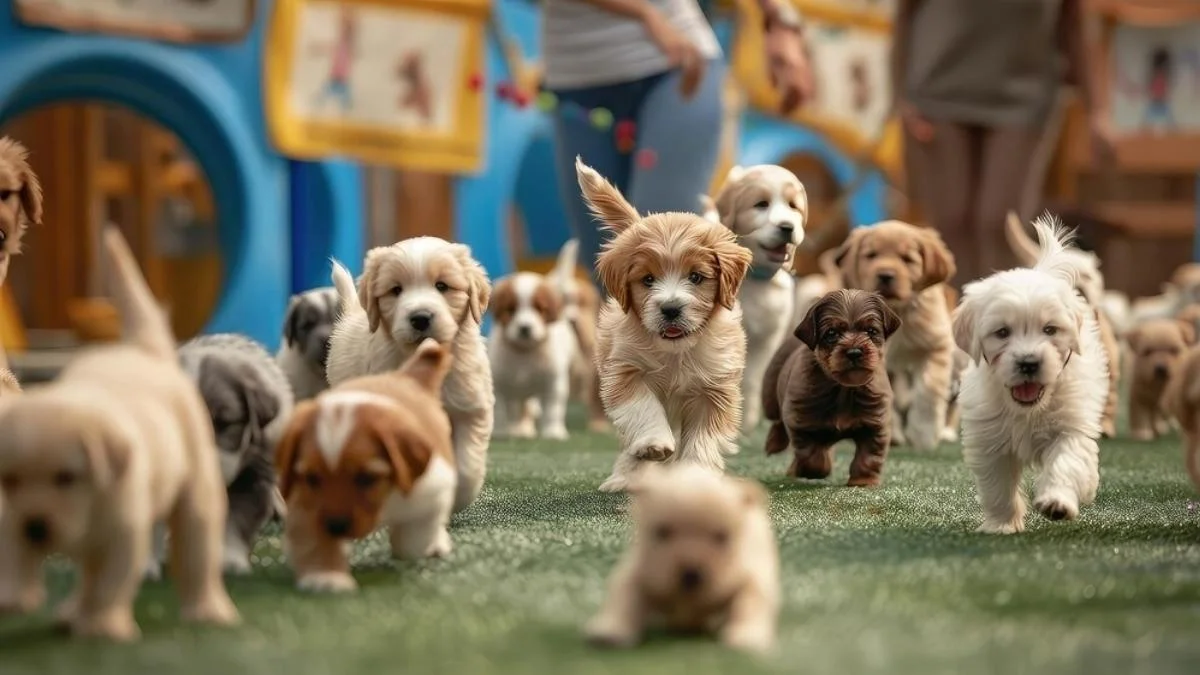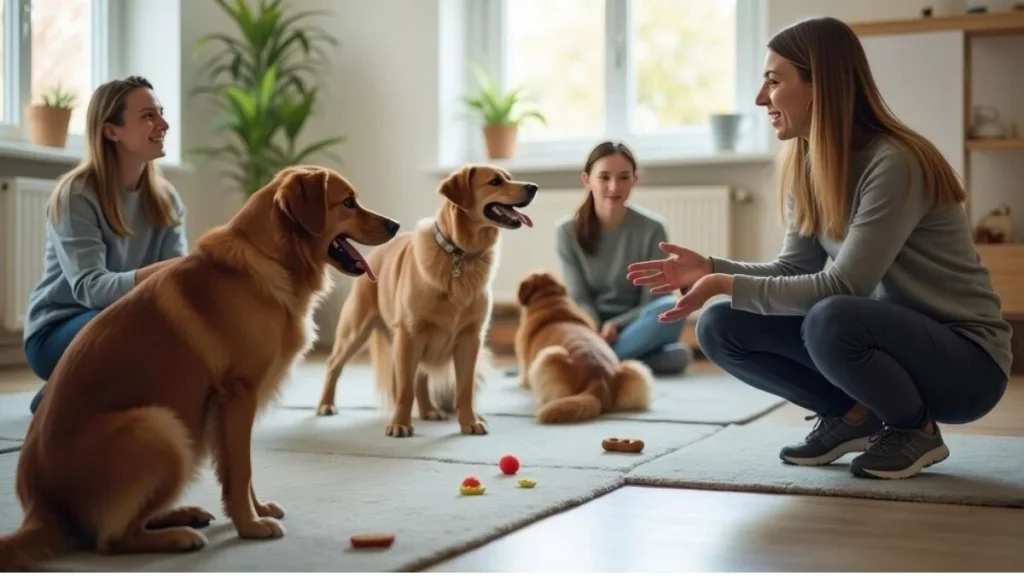TIPS
How Dog Daycare Promotes Socialization and Healthy Habits

Dogs are social animals that thrive on interaction, activity, and routine. However, many pet owners struggle to provide their furry companions with enough exercise and engagement due to busy schedules. Dog daycare offers a structured environment where dogs can play, socialize, and develop positive habits that contribute to their long-term well-being.
Beyond simple supervision, a well-run daycare facility provides dogs with mental stimulation, social learning, and physical exercise, all of which support a balanced and happy lifestyle. This article explores how dog daycare helps improve socialization and fosters healthy habits for dogs of all ages and breeds.
Table of Contents
The Importance of Socialization for Dogs
Socialization is a critical part of a dog’s development, helping them adapt to new environments, people, and other animals. Proper socialization from an early age leads to well-adjusted dogs that are more confident, less anxious, and better behaved.

1. Builds Confidence in Social Interactions
- Exposure to a variety of dogs teach proper greeting and play behaviors.
- Supervised group activities allow dogs to learn social cues in a safe environment.
- Well-socialized dogs are less likely to react negatively to new situations.
2. Reduces Fear and Anxiety
- Dogs that lack socialization may become fearful or aggressive in unfamiliar settings.
- Regular exposure to other dogs and new experiences helps reduce anxiety and stress.
- Positive interactions create a sense of security and comfort.
3. Prevents Behavioral Issues
- Dogs that are isolated may develop destructive habits such as excessive barking or chewing.
- Socializing with other dogs and people provides mental stimulation that prevents boredom.
- Playtime and interaction encourage good behavior and emotional balance.
How Dog Daycare Supports Socialization
A structured dog daycare program provides opportunities for supervised socialization that helps dogs build positive relationships and social skills.
1. Playgroups Designed for Safe Interaction
- Dogs are grouped based on temperament, size, and play style to ensure compatibility.
- Trained staff monitors play to prevent conflicts and encourage healthy engagement.
- Dogs learn to take turns, share toys, and respect boundaries.
2. Exposure to Different Environments and Situations
- Regular daycare visits help dogs become comfortable with new people and surroundings.
- Changes in activities and play partners teach adaptability and flexibility.
- Well-socialized dogs handle new experiences with ease, making travel and outings less stressful.
3. Encourages Proper Canine Communication
- Dogs develop social skills by reading and responding to other dogs’ body language.
- Play interactions teach bite inhibition, appropriate wrestling, and respectful engagement.
- Supervised settings prevent negative encounters and reinforce positive behavior.
Healthy Habits Developed in Dog Daycare
Beyond socialization, dog daycare promotes several important habits that contribute to a dog’s long-term well-being.
1. Regular Exercise for Physical Health
- Running, chasing, and playing with other dogs keep dogs active and fit.
- Exercise helps maintain a healthy weight, reducing the risk of obesity-related issues.
- Active dogs have better cardiovascular health and joint mobility.
2. Structured Routine for Stability
- Consistent schedules help dogs feel secure and reduce anxiety.
- Regular feeding, play, and rest times establish a predictable daily rhythm.
- A structured routine supports training and reinforces discipline.
3. Mental Stimulation to Prevent Boredom
- Puzzle games, interactive toys, and agility activities engage dogs mentally.
- Learning new skills and commands helps keep a dog’s brain sharp.
- Enrichment activities prevent destructive behaviors caused by boredom.
4. Positive Reinforcement and Obedience Training
- Many daycare facilities incorporate basic training into daily activities.
- Dogs learn to follow commands in a high-energy environment, reinforcing discipline.
- Staff members reward good behavior, reinforcing positive habits.
How Dog Daycare Benefits Different Types of Dogs
Different dogs have different needs, and dog daycare provides tailored benefits depending on a dog’s personality and lifestyle.
1. High-Energy Breeds
- Active dogs need frequent exercise to prevent restlessness and destructive behavior.
- Daycare offers structured playtime that helps them release energy in a controlled setting.
2. Puppies and Young Dogs
- Early socialization helps puppies develop confidence and proper play skills.
- Exposure to a variety of dogs and people teaches them how to interact appropriately.
3. Senior Dogs
- Light exercise and social interaction keep older dogs mentally and physically engaged.
- Shorter, supervised play sessions ensure senior dogs stay active without overexertion.
4. Dogs with Separation Anxiety
- Daycare prevents the stress and destructive behaviors that come from being left alone.
- Regular companionship and activities reduce anxiety and promote emotional well-being.
Choosing the Right Dog Daycare
Selecting a daycare facility that prioritizes safety, structure, and positive reinforcement ensures a great experience for both dogs and their owners.
1. Look for a Safe and Clean Environment
- Secure fencing, well-maintained play areas, and clean facilities are essential.
- A structured system for introducing new dogs prevents conflicts.
- Proper ventilation and hygiene reduce the risk of illness.
2. Ensure Experienced and Trained Staff
- Staff should have experience in dog behavior, first aid, and positive reinforcement techniques.
- A low staff-to-dog ratio ensures individual attention and proper supervision.
3. Assess the Facility’s Daily Structure
- A balanced schedule of play, rest, and enrichment activities is key.
- Dogs should have time to relax between active play sessions.
Facilities like Karnik Pet Lodge at Central Avenue provide structured daycare environments where dogs can engage in supervised socialization and activity throughout the day.
Long-Term Benefits of Dog Daycare
Dogs that attend daycare regularly experience lasting improvements in behavior, health, and overall happiness.
1. Improved Behavior in Public and at Home
- Dogs that are well-socialized are more relaxed and adaptable in new situations.
- Consistent exposure to other dogs and people improves behavior in public spaces.
2. Stronger Bonds Between Dogs and Owners
- A well-exercised and mentally stimulated dog is easier to train and live with.
- Owners can enjoy walks, outings, and social activities without worrying about excess energy or anxiety.
3. Increased Confidence and Emotional Stability
- Dogs that interact with different people and environments are less likely to develop fear-based behaviors.
- Regular positive experiences in daycare contribute to a well-balanced and confident pet.
Conclusion
Dog daycare is more than just a place for dogs to stay during the day—it is an environment designed to enhance their socialization, physical health, and overall well-being. Through structured play, supervised interaction, and engaging activities, daycare helps dogs develop positive habits that benefit them both in and out of the facility.
For pet owners looking to provide their dogs with regular exercise, companionship, and enrichment, a quality dog daycare facility is an ideal solution. Regular attendance leads to a happier, healthier, and better-adjusted dog, making daycare a valuable resource for both pets and their owners.
Should you wish to read more, visit our blog page. We’ve got more topics!
-

 GENERAL2 months ago
GENERAL2 months agoUncovering the World of кинокрадко: The Dark Side of Film Piracy
-

 GENERAL1 month ago
GENERAL1 month agoUnveiling the Art of преводсч: How Translators Bridge Language Barriers
-

 YOGA1 year ago
YOGA1 year ago4 Person Yoga Poses for Beginners
-

 GENERAL2 months ago
GENERAL2 months agoThe Journey of iamnobody89757: From Anonymous User to Internet Sensation























